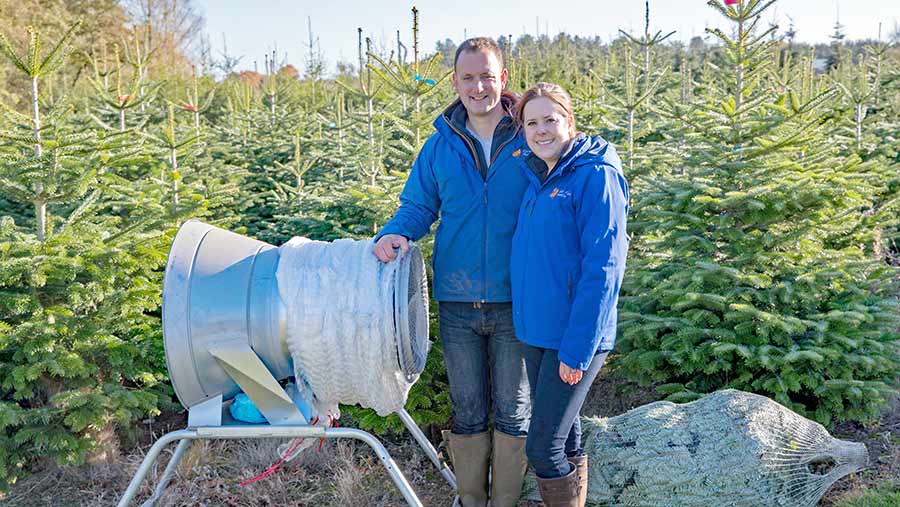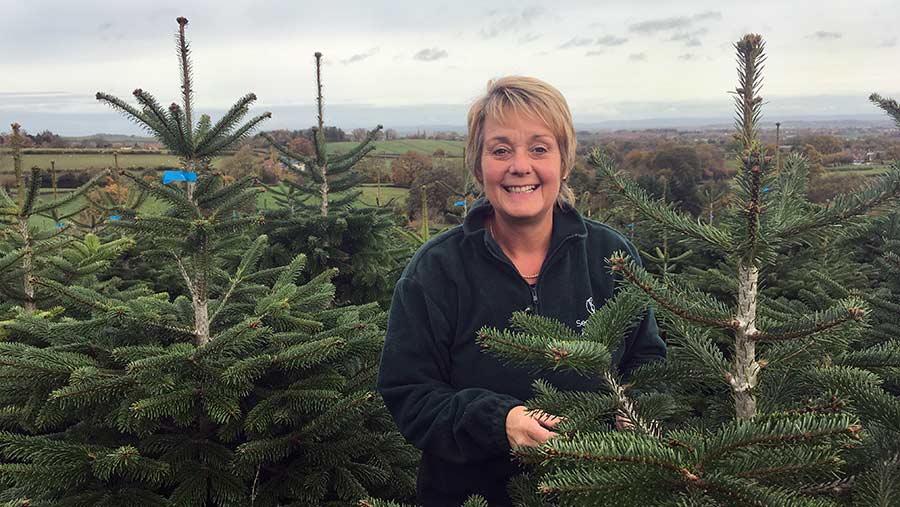So you want to … grow and sell Christmas trees?
A dark green, pyramid-shaped, beautifully-adorned Christmas tree in the corner of your living room can’t be beaten when it comes to classic festive decorations, and farmers have been growing them on their land for decades.
Starting the project can be a daunting prospect, with the expensive equipment, niche agronomy knowledge and long-term investment that is needed to succeed.
But many landowners will tell you it’s well worth the commitment, with the enterprise running smoothly alongside the main farm business.
Here’s what you need to know about growing and selling Christmas trees, with two farmer case studies and expert advice from the CLA.
See also: So you want to… sell your own spirits?
Grower top tips
Christmas tree grower and Farm Consultancy Group member Harry Edwards offers his tips:
- Christmas trees will not yield well on wet soil
- Source seedlings from a trusted and established Christmas tree supplier
- Test your soil for nutrient availability and try to rectify
- It is easy to get suckered into seeing retail prices of £50 a tree but, unless you have a separate retail, 20% of that will be VAT. Speak to a specialist tax accountant for advise on how best to set up your enterprise.
Business advice
CLA forest and woodlands adviser Mike Seville
What is the market like for this type of venture?
The market, especially for new ventures, is usually local.
There is a market to supply national retail outlets but clearly they already have established suppliers who have the resource and the logistical infrastructure to guarantee large-scale quality supply over a very short time span.
How is the market changing?
The choice of trees – plastic or real – is constantly changing. It depends to some extent on the quality and realism of the artificial trees, though there currently seems to be a trend towards completely unrealistic artificial trees with white foliage and inbuilt LED lighting.
It is very difficult to predict what the fashion/demand will be in five years’ time, especially as an artificial tree can last for several years.
Choice will also be dictated by price. Home-grown rooted trees are a premium product and require a premium price. Some consumers will buy on quality, others on price.
The species of tree favoured by the market is also changing. Norway Spruce, the traditional tree, is progressively being superseded by a range of other species with better needle retention.
Is planning permission needed for growing trees?
No.
What about any other permissions?
Nothing is required specifically for growing Christmas trees but you have to abide by existing agricultural/forestry requirements, such as spraying or chainsaw training.
You may need permissions for a retail outlet.
It is no longer acceptable just to plant trees then cut them five years later. The public expect a shaped, dense-foliage tree and this requires annual pruning.
What are the essential requirements?
The ground needs to be relatively fertile with reasonable annual rainfall. It should be easily accessible to the public to facilitate local retail sale but also reasonably secure to deter theft. A location close enough to a local population is a good base to provide a market.
How much will it cost to set up?
It depends entirely upon the scale of the enterprise. At a minimum, your budget needs to include five years’ worth of transplants, plus the cost of labour to plant. Add to this the cost of weed control, pruning, harvesting and selling, along with the cost of any unsold trees.
How long will it take to see a return?
Income is taxable, costs are deductible. It will probably take five years to get to profit.
What about insurance?
Standard public liability should apply. It may be possible to insure against crop failure but this is likely to be expensive.
Key considerations
There are already many established Christmas tree growers. Make sure there is a gap in the market before investing.
Christmas trees can be adversely affected by weather and pests and diseases so it is not a risk-free venture.
Essex farmers invest in Danish products to perfect Christmas trees

© DE Photo
Farm facts
Foxes Farm Produce, Aldham, Colchester, Essex
- Size Approximately 53ha
- Enterprises Christmas trees sold wholesale and retail; pumpkins sold wholesale and pick your own; 6ha corn maze; Farm Mud Run
Guy and Emily French have been growing thousands of Christmas trees at their farm in Essex every year since 2010.
The couple, who are both from farming backgrounds, source Nordmann fir trees from Denmark, grow and cultivate them for up to 10 years, and sell them direct to customers across two sites, and wholesale in the local area.
Though they started buying in trees to stock their first retail site, the enterprise has grown so much over the past eight years that their two retail sites are now supplied by their own trees.
Specialist equipment
Mr and Mrs French have invested in Danish machines, including the Egedal JT PROFF two-row transplanter, which can plant 300-400 trees an hour on set 20m tramlines.
The multi-purpose Egedal E2H machine is used for spreading fertiliser, spraying, pruning and harvesting the trees.
YaraMila complex fertiliser is used to create the classic dark green colour.
Top-stop chemical is rolled on to the leader (where the fairy is placed) with a sponge to control its height and ensure energy is put into replacing sap rather than growing too spindly.
To create the popular Christmas tree shape, fork pruning (taking out the middle branch) has to take place during the winter.
“We use a Christmas tree contractor for pruning and leader control, because these are the most important jobs for getting the quality up,” said Mr French.
Selling to the public
The Nordmann firs are graded premium (perfect), standard (slight defect), and third grade (no market).
Mr French says people tend to want to pay for a premium tree and about 60% of their sales are from this grade.
To encourage custom, the Frenches offer discounts to those buying pumpkins if they return for a tree, free stand fittings, free delivery within two miles and present their products upright on pins.
During the festive season’s weekends, up to 10 part-time staff members will be working at each site, assisting Mr and Mrs French, a part-time admin assistant, seasonal farmworker and agency labour for harvesting.
Top tips
A willingness to learn, good staff management, marketing knowledge and the ability to commit to and invest in a long-term project are key skills needed to succeed in Christmas trees, says Mr French.
“You can’t change things quickly or vary the plan – what we plant now we won’t sell for an average of eight years so the capital is tied up for that long,” he explained.
Difficulties include limited local agronomy information, and having to invest heavily in niche equipment.
Mr French advises anyone looking to get into the enterprise to establish an outlet, start small, and look into retail, where the premium is, before wholesale.
“Hopefully it’s a Brexit-proof market,” he added. “No matter what happens, Christmas isn’t going anywhere!”
Reasonable prices keep customers keen at Somerset site

Farm facts
Cobbs Cross Farm, Goathurst, Somerset
- Size 162ha
- Enterprises: 20ha of Christmas trees; 20,000 free-range, organic chickens, beef suckler herd, glamping, yurts, and vineyards
John and Jan Hardwick have been growing 8ha of Europe-sourced Christmas trees at Cobbs Cross Farm in Somerset for more than 20 years.
Sons Rob and Will have joined the family business, which was first prompted by the demand for trees from Mr Hardwick’s wholesale potato contacts.
As friends started to show interest in buying trees, the family started selling a few in their yard, which has grown into one retail site in Portishead, near Bristol, and one at the home farm.
Secret Valley
Under the Secret Valley brand, the Hardwicks sell Nordmann firs, Norway spruces and Fraser firs from 4ft-12ft high. The popular but most expensive Nordmann fir costs £75 for a 10ft tree.
“Our prices are reasonable, there’s no point being Greedy because people won’t come back,” Mrs Hardwick said.
“We depend on a lot of word of mouth, and we’re always looking to attract younger buyers because they are the future.”
Choosing a tree at Cobbs Cross becomes a real event, with wine tasting, a Father Christmas postbox and snowball area.
Next steps
Each year the Hardwick family try to add something new to the site to promote their trees, such as the recent introduction of selling friends’ Christmas decorations onsite.
This time, wonky trees could be the answer. Following the trend of selling imperfect fruit and vegetables, Mrs Hardwick hopes some buyers might take on trees with slight defects, which would usually remain unsold, for a reduced price.
A new planter that uses GPS to create straight, uniform tree rows will be the next investment.
